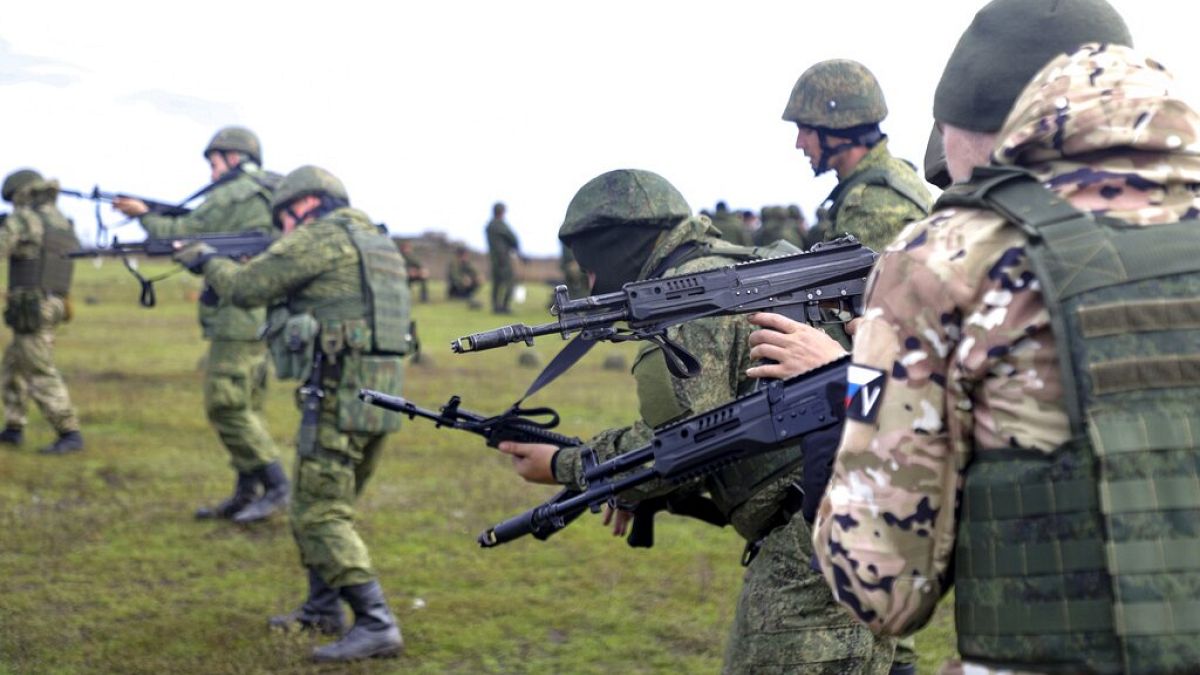A video of soldiers brandishing a Turkish flag has gone viral on social media with some claiming that the men are mercenaries sent to fight for Russia in the war in Ukraine.
A video has been gaining traction on social media allegedly showing Turkish mercenaries going to fight for Russia in the Ukraine war.
The video shows two soldiers holding a Turkish flag and expressing their readiness to get involved in the conflict.
"We are coming there with the help of Allah. We have our flag... We are gonna go and come back with the help of Allah," says a man with a Turkish flag attached to his bulletproof vest.
The second individual in the video is holding a Turkish flag and his uniform has a Turkish and Russian flag sown onto it.
The letter 'Z' is visible on the Russian flag - a symbol of Russia's invasion of Ukraine, signalling that the video is a recent one.
The clip was first published on Monday by a pro-Russian Telegram channel claiming that "Turkish legionnaires joined the Russian army and will take part in combat operations in Ukraine".
But it quickly gained traction when Nexta shared it with a similar claim, racking more than 750,000 views on Twitter.
But are Turkish mercenaries really being sent to Ukraine?
Journalists from Euronews Turkish-language service confirmed that the men are speaking a dialect of Turkish but are not from Turkey.
The mix between this dialect and some Russian words signals that these men are most likely Ahiska Turks (also known as Meskhetian Turks).
According to the World Directory of Minorities and Indigenous Peoples, Meskhetian Turks used to live along the Turkish-Georgian border and were deported in 1944 by Joseph Stalin to various Central Asian Soviet republics, such as Uzbekistan and Kazakhstan.
In June 1989, Ahiska Turks in Uzbekistan were attacked by Uzbeks and more than 100 were killed. As a result, Soviet troops deported over 87,000 Ahiska Turks to Russia.
Today, many of them have since relocated to Azerbaijan, Georgia, Kazakhstan, and Russia including in the North Caucasus (such as Chechnya and North Ossetia).
Euronews spoke to a representative of Ahiska Turks abroad who confirmed that the men in the video are speaking the Ahiska dialect.
He also explained that he believes these are men living in Russia and therefore being mobilised for the war in Ukraine.
He also explained that since Ahiska Turks consider themselves Turkish, this is why the soldiers are seen brandishing the flag in the video.
This was also echoed by Alik Puhati, a journalist based in North Caucasus. "We have a small community of Meskhetian Turks living in Ossetia, and they were mobilised just like everyone else," he told Euronews.
Two weeks ago, Alik Puhati published photos claiming that an Ahiska Turk was among those mobilised in Ossetia.
Similar to the soldiers in the video, the man is also wearing a patch with the Turkish flag and the letter "Z" drawn over the Ossetian flag above.
According to the deputy military commissariat of Ossetia, more than 400 men have been mobilised to fight in Ukraine. The goal is to conscript 1,000 more in the Ossetia region.
InformNapalm, an international community of internet sleuths, claim that they have identified one of the men in the video, saying he lives in Prokhladny, in the North Caucasus region and is an Ahiska Turk.
Therefore, it is highly unlikely that these men are not Turkish mercenaries but rather ethnic minorities residing in Russia that have been mobilised to fight in Ukraine.
